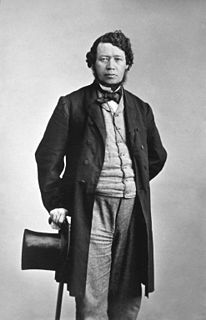A Quote by Hunter S. Thompson
Quacks are a part of our culture, and we all fall prey to them. Who among us can say, for sure, that even our own personal physicians are honest and competent?
Related Quotes
It is one of the paradoxes of parenting, and often a painful paradox, that even as our children need us for love and trust, they also need us for honest differing. It's not only over limits and rules...[but also] about what we represent in the way of culture, traditions, and values. We owe it to our children to let them know what we believe, and if they differ with us, we owe it to them to be honest adversaries, for it is through this honest confrontation that children can grow into adults who have a firm sense of their place in the sequence of the generations.
In our memories, there is a graveyard where we bury our dead. They all lie there together, the loved ones and the ones we hated, friends and foes and kin, with no distinction among them. We have to mourn every one of them, because our memories have made them as much a part of us as our bones or our skin. If we don't, we've no right to remember anything at all.
...when we abandon visible riches... it is strange goods and not our own that we are leaving. And this is so even if we boast that we acquired them through our own efforts or that they were passed on to us as an inheritance. I say nothing is ours except what is in our hearts, what belongs to our souls, what cannot be taken away by anyone.
It is our own pain, and our own desire to be free of it, that alerts us to the suffering of the world. It is our personal discovery that pain can be acknowledged, even held lovingly, that enables us to look at the pain around us unflinchingly and feel compassion being born in us. We need to start with ourselves.
There is nothing very odd about lambs disliking birds of prey, but this is no reason for holding it against large birds of prey that they carry off lambs. And when the lambs whisper among themselves, "These birds of prey are evil, and does this not give us a right to say that whatever is the opposite of a bird of prey must be good," there is nothing intrinsically wrong with such an argument-though the birds of prey will look somewhat quizzically and say, We have nothing against these good lambs; in fact, we love them; nothing tastes better than a tender lamb.
Before making peace, war is necessary, and that war must be made with our self. Our worst enemy is our self: our faults, our weaknesses, our limitations. And our mind is such a traitor! What does it? It covers our faults even from our own eyes, and points out to us the reason for all our difficulties: others! So it constantly deludes us, keeping us unaware of the real enemy, and pushes us towards those others to fight them, showing them to us as our enemies.
If we are true to Canada, if we do not desire to become part and parcel of these people, we cannot overlook this the greatest revolution of our times. Let us remember this, that when the three cries among our next neighbours are money, taxation, blood, it is time for us to provide for our own security.
To say that it is not our fault does not relieve us of responsibility. However, we may not have polluted the air, but we need to take responsibility, along with others, for cleaning it up. Each of us needs to look at our own behavior. Am I perpetuating and reinforcing the negative messages so pervasive in our culture, or am I seeking to challenge them?
What I want to argue for is not that we should give up on our ideas of success, but that we should make sure that they are our own. We should focus in on our ideas and make sure that we own them, that we're truly the authors of our own ambitions. Because it's bad enough not getting what you want, but it's even worse to have an idea of what it is you want and find out at the end of the journey that it isn't, in fact, what you wanted all along.
An observer will see the bizarre developments of behavior only in alien cultures, not his own. Nevertheless this is obviously a local and temporary bias. There is no reason to suppose that any one culture has seized upon an eternal sanity and will stand in history as a solitary solution of the human problem. Even the next generation knows better. Our only scientific course is to consider our own culture, so far as we are able, as one example among innumerable others of the variant configurations of human culture.
The hardest part of being a Christian is surrendering and that is where the real struggle happens. Once we have overcome our own desire to be elevated, our own desire to be recognized, our own desire to be independent and all those things that we value very much because we are Americans and we are part of this American culture. Once we have overcome that struggle then God can use us as a part of His body to accomplish what the body of Christ was left here to accomplish.

































